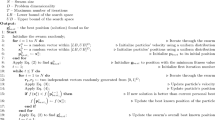Abstract
A simplex particle swarm optimization (simplex-PSO) derived from the Nelder-Mead simplex method was proposed to optimize the high dimensionality functions. In simplex-PSO, the velocity term was abandoned and its reference objectives were the best particle and the centroid of all particles except the best particle. The convergence theorems of linear time-varying discrete system proved that simplex-PSO is of consistent asymptotic convergence. In order to reduce the probability of trapping into a local optimal value, an extremum mutation was introduced into simplex-PSO and simplex-PSO-t (simplex-PSO with turbulence) was devised. Several experiments were carried out to verify the validity of simplex-PSO and simplex-PSO-t, and the experimental results confirmed the conclusions: (1) simplex-PSO-t can optimize high-dimension functions with 200-dimensionality; (2) compared PSO with chaos PSO (CPSO), the best optimum index increases by a factor of 1×102–1×104.
Similar content being viewed by others
References
CLERC M. Stagnation analysis in particle swarm optimizer [R]. Colchester: Department of Computer Science, University of Essex, 2006.
CLERC M, KENNEDY M. The particle swarm-explosion, stability, and convergence in multidimensional complex space [J]. IEEE Transaction on Evolutionary Computation, 2002, 6(1): 58–73.
LANGDON W B. Kernel methods for PSOs [R]. Colchester: Department of Computer Science, University of Essex, 2005.
ROBERTO B, MAURO B, SRINIVAS P. Do not be afraid of local minima [R]. Trento: Department of Information and Communication Technology, University of Trento, 2005.
AUGER A, HANSEN N. A restart CMA evolution strategy with increasing population size [C]// CORNE D, MICHALEWICZ Z, MCKAY B, FOGEL D. Proceeding of the 2005 IEEE Congress on Evolutionary Computation. Edinburgh: IEEE Press, 2005: 1769–1775.
E Gang-qiang, XUN Shi-yu. Particle swarm optimization based on dynamic population size [J]. Information and Control, 2008, 37(1): 18–27. (in Chinese)
LI Ting, LAI Xu-zhi, WU Min. A novel two-swarm based particle swarm optimization algorithm for optimal power flow problem [J]. Journal of Central South University: Science and Technology, 2007, 38(1): 133–137. (in Chinese)
LIU Hong-bo, WANG Xiu-kun, TAN Guo-zhen. Convergence analysis of particle swarm optimization and improvement of chaotic [J]. Control and Decision, 2006, 21(6): 636–640. (in Chinese)
LANGDON W B, RICCARDO P. Evolving problems to learn about particle swarm and other optimizers [C]// EDINBURGH. Proceedings of the 2005 Genetic and Evolutionary Computation Conference for ACM SIGEVO (GECCO2005). New York: ACM Press, 2005: 81–88.
LIU Bo, WANG Ling, JIN Yi-hui, TANG Fang, HUANG De-xian. Improved particles swarm optimization combined with chaos [J]. Chaos, Solitons and Fractals, 2005, 25(5): 1261–1271.
LEE H P, LIANG Y C. An improved GA and a novel PSO-GA-based hybrid algorithm [J]. Information Processing Letters, 2005, 93(5): 255–261.
GUANG Qiang-li, ZHAO Feng-qiang. Parallel hybrid PSO-GA algorithm and its application to layout design [J]. Structural and Multidisciplinary Optimization, 2006, 33(5): 749–758.
GEORGE A D, HAFTKA R T. Parallel asynchronous particle swarm optimization [J]. International Journal for Numerical Method in Engineering, 2006, 67(5): 578–595.
SCHUFFE J F, REINBOLT J A. Parallel global optimization with particle swarm algorithm [J]. International Journal of Numerical Methods in Engineering, 2004, 61(13): 2296–2315.
KENNEDY J, EBERHART R C. Bare bones particle swarms [J]. Evolution Computation, 2003, 12(6): 258–265.
CHRISTOPHER K, KEVIN D. The Kalman swarm: A new approach to particle motion in swarm optimization [C]// SAHNI S. Proceedings of the third IASTED International Conference Advances in Computer Science and Technology. Calgary: ACTA Press, 2007: 606–614.
HU Wang, LI Zhi-shu. A simpler and more effective particle swarm optimization [J]. Journal of Software, 2007, 18(4): 861–868. (in Chinese)
NELDER J A, MEAD R. A simplex method for function minimum [J]. Computer Journal, 1965, 7(2): 308–313.
HELIO J C, CARLILE C L. A GA-simplex hybrid algorithm for global minimization of molecular potential energy functions [J]. Annals of Operation Research, 2005, 38(1): 189–202.
WANG Fang, QIU Yu-hui. A novel particle swarm algorithm using simplex method [J]. Information and Control, 2005, 34(1): 9–14. (in Chinese)
XIAO Yang. Analysis of dynamical systems [M]. Beijing City: Beifang Jiaotong University Press, 2002: 64–73. (in Chinese)
YEN J, LIAO J C, BOGJU G. A hybrid approach to modeling metabolic systems using a genetic algorithm and simplex method [J]. Parallel Computing, 2002, 28(2): 173–191.
MAHFOUF M, LINKENS D A. Adaptive weighted swarm optimization for multiobjective optimal design of alloy steels [R]. Colchester: Department of Computer Science, University of Essex, 2006.
CHEN Wei, SHI Shang-jang. The development of information guided evolution algorithm for global optimization [J]. Journal of Global Optimization, 2006, 36(4): 517–535.
JASON T, NOR R M. Hybridizing adaptive and non-adaptive mutation for cooperative exploration of complex multimodal search space [C]// SAHNI S. Proceedings of the third IASTED International Conference Advances in Computer Science and Technology. Calgary: ACTA Press, 2007: 476–498.
ZHANG Guo-li, LU Hai-yan. Hybrid real-coded genetic algorithm with quasic-simplex technology [J]. International Journal of Computer Science and Network Security, 2006, 6(10): 246–256.
DEB K, ANAND A, JOSHI D. A computationally efficient evolutionary algorithm for real-parameter evolution [J]. Evolutionary Computation, 2005, 13(4): 371–395.
DEB K, SINDHYA K, OKABE T. Self-adaptive simulated binary crossover for real-parameter optimization [C]// Proceedings of the 2007 Genetic and Evolutionary Computation Conference for ACM SIGEVO (GECCO-2007). New York: ACM Press, 2007: 414–419.
Author information
Authors and Affiliations
Corresponding author
Additional information
Foundation item: Project(50275150) supported by the National Natural Science Foundation of China; Project(20070533131) supported by Research Fund for the Doctoral Program of Higher Education of China
Rights and permissions
About this article
Cite this article
Xiao, Hf., Tan, Gz. A novel particle swarm optimizer without velocity: Simplex-PSO. J. Cent. South Univ. Technol. 17, 349–356 (2010). https://doi.org/10.1007/s11771-010-0052-0
Received:
Accepted:
Published:
Issue Date:
DOI: https://doi.org/10.1007/s11771-010-0052-0




